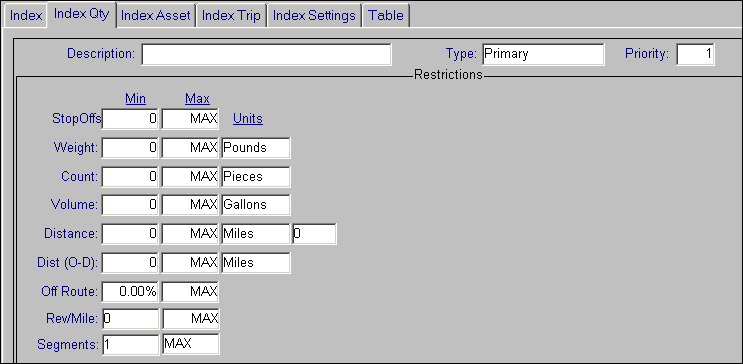Index Qty tab
This tab enables you to restrict rates based on minimum and/or maximum quantities.

The fields are listed in the order in which you tab through them.
Field | Definition |
|---|---|
Stop Offs: Min/Max | These fields allow you to specify the minimum and/or maximum stops that may exist on a trip for which this rate schedule is applicable. Specify the number of stops on the trip that are in addition to the free stops allowed by your company For example, suppose your company uses two free stops for pay purposes. Entering 1 in the Min. field and 4 in the Max field causes the system to reject any trips having less than three stops, or more than six stops. |
Weight: Min/Max/Units | These fields allow you to specify the minimum and/or maximum total weight recorded for a trip for which this rate schedule is applicable. Use the Units field to specify the appropriate unit of measure. These fields correspond to the total weight recorded an order. For example, if you enter 40,000 in the Min. field and Pounds in the Units field, the system will not use the rate schedule for any trips involving cargo that weighs less than 40,000 pounds. See notes at the end of this topic for restrictions. |
Count: Min/Max/Units | These fields allow you to specify the minimum and/or maximum total freight count recorded for a trip for which this rate schedule is applicable. Use the Units field to specify the appropriate unit of measure. These fields correspond to the total count recorded on the order. For example, if you enter 45,000 in the Min. field and Pieces in the Units field, the system will not use the rate schedule for any trips involving cargo that consists of less than 45,000 pieces. See notes at the end of this topic for restrictions. |
Volume: Min/Max/Units | These fields allow you to specify the minimum and/or maximum total freight volume recorded for a trip for which this rate schedule is applicable. Use the Units field to specify the appropriate unit of measure. These fields correspond to the total volume recorded on the order. For example, if you enter 45,000 in the Min. field and Gallons in the Units field, the system will not use the rate schedule for any trips involving cargo that consists of less than 45,000 gallons. See note at the end of this topic for restrictions. |
Distance: Min/Max/Units | These fields allow you to specify the minimum and/or maximum total miles recorded for a trip for which this rate schedule is applicable. These fields correspond to the total route miles (empty and loaded) on a trip. Use the Units field to specify the appropriate unit of measure. For example, if you enter 250 in the Min. field and Miles in the Units field, the system will not use the rate schedule for any trips for which the resource traveled less than 250 miles. |
Dist (O-D): Min/Max/Units | Not supported for pay rates; can be used only for billing rates. |
Off Route: Min/Max/Units | Not supported for pay rates; can be used only for billing rates. |
Rev/Mile: Min/Max | These fields allow you to restrict the application of a pay rate based on minimum and/or maximum revenue per mile amount. These restrictions are functional only when you are creating pay for an order that has already been invoiced. To determine the revenue amount it must use when calculating the revenue per mile, the system looks at the dollar amount that is in the Pay Revenue field on the invoice header. By default, this amount is the same as the line haul charge. But a user could opt to change it in Order Entry, Dispatch, or Invoicing. Typically, you would do this if you want to charge the customer one amount, but you want to pay the resource a percent of line haul that is lower than what you actually bill. |
Segments: Min/Max | Total number of trip segments allowed for the move associated with the segment being rated. |
Notes:
1. You cannot set restrictions for both weight and volume on the same rate index. If you attempt to save minimum and/or maximum values for both the Weight and Volume fields, the system will display this message: “A min/max value is permitted for only one pair of values. Please choose one set: either weight or volume.”
2. The Min/Max weight, volume, and count restrictions are not supported for consolidated trips or for cross docked trips.